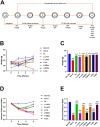Combined Administration of Lactobacillus or Bifidobacterium Offers Enhanced Antidepressant and Anxiolytic Activity in a Dose Dependent Manner
- PMID: 40384043
- PMCID: PMC12086308
- DOI: 10.1002/brb3.70564
Combined Administration of Lactobacillus or Bifidobacterium Offers Enhanced Antidepressant and Anxiolytic Activity in a Dose Dependent Manner
Abstract
Purpose: Gut microbiota is strongly linked to the activity of the bidirectional gut-brain axis, which influences neuropsychological processes at multiple levels. Changes in the gut microbiota have been implicated in mood disorders, and probiotics have been explored for their ability to mitigate the effects of stress on mental health. Here, we investigated the therapeutic benefits of different concentrations and combinations of Lactobacillus and Bifidobacterium in a mouse model of stress induced depression and anxiety.
Methods: Sixty-three male ICR mice (6-8 weeks old; 20-25g) divided into nine groups were used for this study. The test groups underwent chronic unpredictable mild stress protocols for two weeks before receiving low (104 CFU/ml) or high (108 CFU/ml) doses of either monotherapy (Lactobacillus or Bifidobacterium) or a combination therapy (Lactobacillus and Bifidobacterium) for four weeks. The antidepressant, fluoxetine, served as the positive control. Measurements of weight and sucrose preference were performed at four time points in addition to a battery of behavioral tests (open field tests, forced swim test, tail suspension test, and hot plate test) at the endpoint to assess depression and anxiety-like behavior.
Results: Low doses of the probiotic formulation (mono- or combined therapy) reversed weight loss but not anhedonia. In contrast, high doses of probiotic formulations (mono- or combined therapy), along with fluoxetine, were effective in reversing the weight loss and anhedonia caused by chronic unpredictable mild stress. Probiotics ameliorated stress-induced immobility as measured by both the forced swim and tail suspension tests, while also reducing anxiety-like behavior (increased peripheral activity) in the open field test. High doses of mono- or combined therapy increased curling behavior in the tail suspension test, whereas fluoxetine failed to do so.
Conclusion: This study indicates the species- and dose-dependent beneficial effects of probiotics on behavioral outcomes associated with depression while also reversing weight loss. Evidence suggests that probiotics and fluoxetine may exert antidepressant activity via different mechanisms.
Keywords: gut microbiome; lactic acid bacteria; mental health; probiotics.
© 2025 The Author(s). Brain and Behavior published by Wiley Periodicals LLC.
Figures



References
-
- Agus, A. , Planchais J., and Sokol H.. 2018. “Gut Microbiota Regulation of Tryptophan Metabolism in Health and Disease.” Cell Host & Microbe 23, no. 6: 716–724. - PubMed
-
- Barrett, E. , Ross R. P., O'Toole P. W., Fitzgerald G. F., and Stanton C.. 2012. “Gamma Aminobutyric Acid Production by Culturable Bacteria in Human Intestine.” Journal of Applied Microbiology 113: 411–417. - PubMed
-
- Berrocoso, E. , Ikeda K., Sora I., Uhl G. R., P. Sanchez‐Bla ´ zquez, and Mico J. A.. 2013. “Active Behaviours Produced by Antidepressants and Opioids in the Mouse Tail Suspension Test.” International Journal of Neuropsychopharmacology 16: 151–162. - PubMed
-
- Bravo, J. A. , Forsythe P., Chew M. V., et al. 2011. “Ingestion of Lactobacillus Strain Regulates Emotional Behavior and Central GABA Receptor Expression in a Mouse Via the Vagus Nerve.” Proceedings of the National Academy of Sciences 108, no. 38: 16050–16055. 10.1073/pnas.1102999108. - DOI - PMC - PubMed
MeSH terms
Substances
LinkOut - more resources
Full Text Sources
Medical

